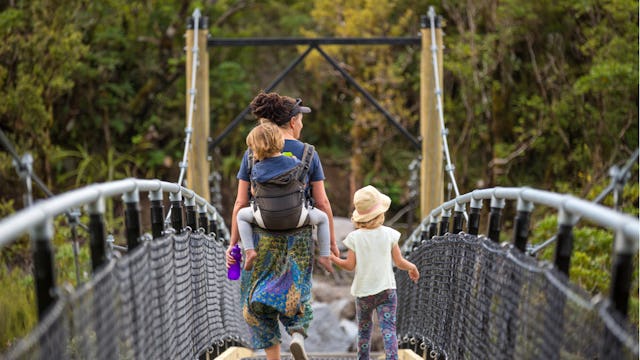On Your Last Parenting Nerve? It's Time To Take A Walk. Literally.

The dreaded witching hour.
An exhausting day that saw both your toddler and new baby not nap whatsoever.
Your patience level already deep in the red, your husband calls and says he has to work late, and you’ll be doing the bedtime dance solo.
Before you grab that glass of wine in an attempt to flounder your way through the last soul-sucking hours of the day, try something else — go for a walk, because science says so.
An evening walk with my kids when they were little was my saving grace. It became part of our bedtime routine — when right after baths and before stories — we would buckle our pajama-clad crew into their stroller and take a long stroll around our block. Everyone’s blood pressure and tempers seemed to ease, and if my husband was home, we would take advantage of those 20 minutes to reconnect after our very separate days. Our daily evening walks had no regular route or time frame. Rather, we choose to instead see what the evening walk gave us, and sometimes it gave us 30 minutes of quiet bliss and we inhaled the peaceful glory of it.
And of course, there were other times when after five minutes with little ones who were fighting settling down with all their might, we would realize this wasn’t our night and we simply headed home. Our family walks became almost as sacred as nap time, and as the kids grew, they craved them just as much.
Now that my kids are older, we have turned our evening short walks into hourlong hikes while on vacation or on long weekends when we can find the time. Walking has long been documented to be an amazing stress reliever and, coupled with the healing properties of the outdoors, has the ability to reduce stress hormones in the body. Though our long walks and hikes may often start with complaining and whiny kids, they never end that way.
As we stroll and our bodies start to literally (and figuratively) disconnect from all the things in our life that we are tethered to, both myself and the kids settle into a quiet rhythm of left foot, right foot. It gives all of us a chance to filter out the noise of life, and do it in each other’s company — an added bonus. Often, it opens up conversation in the same way riding alone in a car with a teenager does. Walking with the kids seems both private and inclusive, and you may find it helps quiet tweens and teens open up about what’s going in their lives.
But beyond what walking can do for you and your family’s attitude is what it can do for your own body. And I’m not talking about treating it as a fitness workout. In fact, studies show that lifelong slow, steady movement, such as frequently taking long walks, in lieu of high-intensity cardio is a common practice among those living to age 100.
Long walks make your and your kids’ brains stronger, firing up neurons as you move forward. Walking also helps release creative thought and will help you work through the day’s stresses and problems simply by putting one front of the other. Because of its simplicity, it’s akin to meditation in many ways and increases focus. It’s also the best way to resist a sedentary lifestyle.
No need to make a big deal out of starting walking as an antidote to the stresses of parenting, or as a simple way to connect with your kids. It’s probably the simplest thing you’ll do all day, but with the biggest of benefits. Take it slow and easy, starting off and just seeing where your feet take you, and set zero expectations about it. Let it organically become an unforced habit, and then watch your children’s attitudes begin to relax and let walking become your new daily quality time.